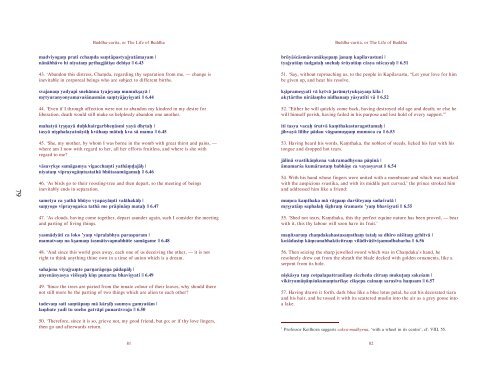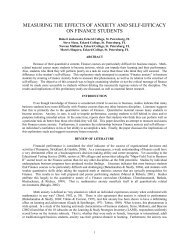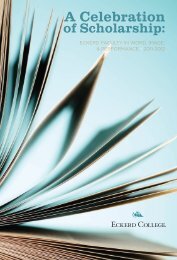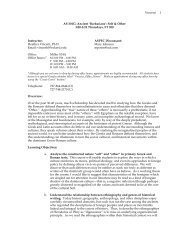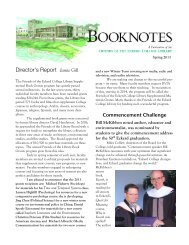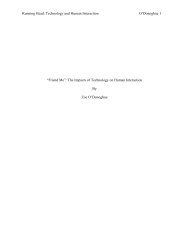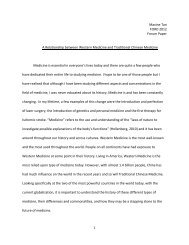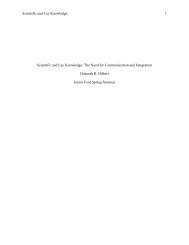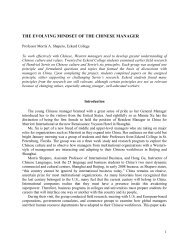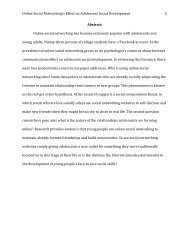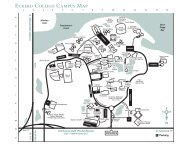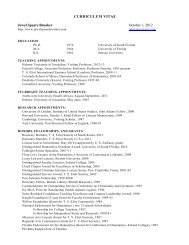You also want an ePaper? Increase the reach of your titles
YUMPU automatically turns print PDFs into web optimized ePapers that Google loves.
79<br />
<strong>Buddha</strong>-carita, or <strong>The</strong> Life of <strong>Buddha</strong><br />
madviyogaü prati cchaüda saütàpastyajyatàmayam |<br />
nànàbhàvo hi niyataü pÔthagjàtiùu dehiùu || 6.43<br />
43. `Abandon this distress, Chaüda, regarding thy separation from me, Þ change is<br />
inevitable in corporeal beings who are subject to different births.<br />
svajanaü yadyapi snehànna tyajeyaü mumukùayà |<br />
mÔtyuranyonyamavaèànasmàn saütyàjayiùyati || 6.44<br />
44. `Even if I through affection were not to abandon my kindred in my desire for<br />
liberation, death would still make us helplessly abandon one another.<br />
mahatyà tÔùõayà duþkhairgarbheõàsmi yayà dhÔtaþ |<br />
tasyà niùphalayatnàyàþ kvàhaü màtuþ kva sà mama || 6.45<br />
45. `She, my mother, by whom I was borne in the womb with great thirst and pains, Þ<br />
where am I now with regard to her, all her efforts fruitless, and where is she with<br />
regard to me?<br />
vàsavÔkùe samàgamya vigacchaüti yathàüóajàþ |<br />
niyataü viprayogàütastathà bhåtasamàgamaþ || 6.46<br />
46. `As birds go to their roosting-tree and then depart, so the meeting of beings<br />
inevitably ends in separation.<br />
sametya ca yathà bhåyo vyapayàüti valàhakàþ |<br />
saüyogo viprayogaèca tathà me pràõinàü mataþ || 6.47<br />
47. `As clouds, having come together, depart asunder again, such I consider the meeting<br />
and parting of living things.<br />
yasmàdyàti ca loko 'yaü vipralabhya parasparam |<br />
mamatvaü na kùamaü tasmàtsvapnabhåte samàgame || 6.48<br />
48. `And since this world goes away, each one of us deceiving the other, Þ it is not<br />
right to think anything thine own in a time of union which is a dream.<br />
sahajena viyujyaüte parõaràgeõa pàdapàþ |<br />
anyenànyasya vièleùaþ kiü punarna bhaviùyati || 6.49<br />
49. `Since the trees are parted from the innate colour of their leaves, why should there<br />
not still more be the parting of two things which are alien to each other?<br />
tadevaü sati saütàpaü mà kàrùãþ saumya gamyatàm |<br />
laübate yadi tu sneho gatvàpi punaràvraja || 6.50<br />
50. `<strong>The</strong>refore, since it is so, grieve not, my good friend, but go; or if thy love lingers,<br />
then go and afterwards return.<br />
81<br />
<strong>Buddha</strong>-carita, or <strong>The</strong> Life of <strong>Buddha</strong><br />
bråyàècàsmàsvanàkùepaü janaü kapilavastuni |<br />
tyajyatàü tadgataþ snehaþ èråyatàü càsya niècayaþ || 6.51<br />
51. `Say, without reproaching us, to the people in Kapilavastu, ßLet your love for him<br />
be given up, and hear his resolve.<br />
kùiprameùyati và kÔtvà jaràmÔtyukùayaü kila |<br />
akÔtàrtho niràlaübo nidhanaü yàsyatãti và || 6.52<br />
52. ßEither he will quickly come back, having destroyed old age and death; or else he<br />
will himself perish, having failed in his purpose and lost hold of every support."'<br />
iti tasya vacaþ èrutvà kaüthakasturagottamaþ |<br />
jihvayà lilihe pàdau vàùpamuùõaü mumoca ca || 6.53<br />
53. Having heard his words, Kaüthaka, the noblest of steeds, licked his feet with his<br />
tongue and dropped hot tears.<br />
jàlinà svastikàükena vakramadhyena pàõinà |<br />
àmamarèa kumàrastaü babhàùe ca vayasyavat || 6.54<br />
54. With his hand whose fingers were united with a membrane and which was marked<br />
with the auspicious svastika, and with its middle part curved, 1 the prince stroked him<br />
and addressed him like a friend:<br />
muüca kaüthaka mà vàùpaü darèiteyaü sadaèvatà |<br />
mÔùyatàü saphalaþ èãghraü èramaste 'yaü bhaviùyati || 6.55<br />
55. `Shed not tears, Kaüthaka, this thy perfect equine nature has been proved, Þ bear<br />
with it, this thy labour will soon have its fruit.'<br />
maõitsaruü chaüdakahastasaüsthaü tataþ sa dhãro nièitaü gÔhãtvà |<br />
koèàdasiü kàücanabhakticitraü vilàdivàèãviùamudbabarha || 6.56<br />
56. <strong>The</strong>n seizing the sharp jewelled sword which was in Chaüdaka's hand, he<br />
resolutely drew out from the sheath the blade decked with golden ornaments, like a<br />
serpent from its hole.<br />
niùkàsya taü cotpalapattranãlaü ciccheda citraü mukuñaü sakeèam |<br />
vikãryamàõàüèukamaütarãkùe cikùepa cainaü sarasãva haüsam || 6.57<br />
57. Having drawn it forth, dark blue like a blue lotus petal, he cut his decorated tiara<br />
and his hair, and he tossed it with its scattered muslin into the air as a grey goose into<br />
a lake.<br />
1 Professor Keilhorn suggests cakra-madhyena, `with a wheel in its centre', cf. VIII, 55.<br />
82


